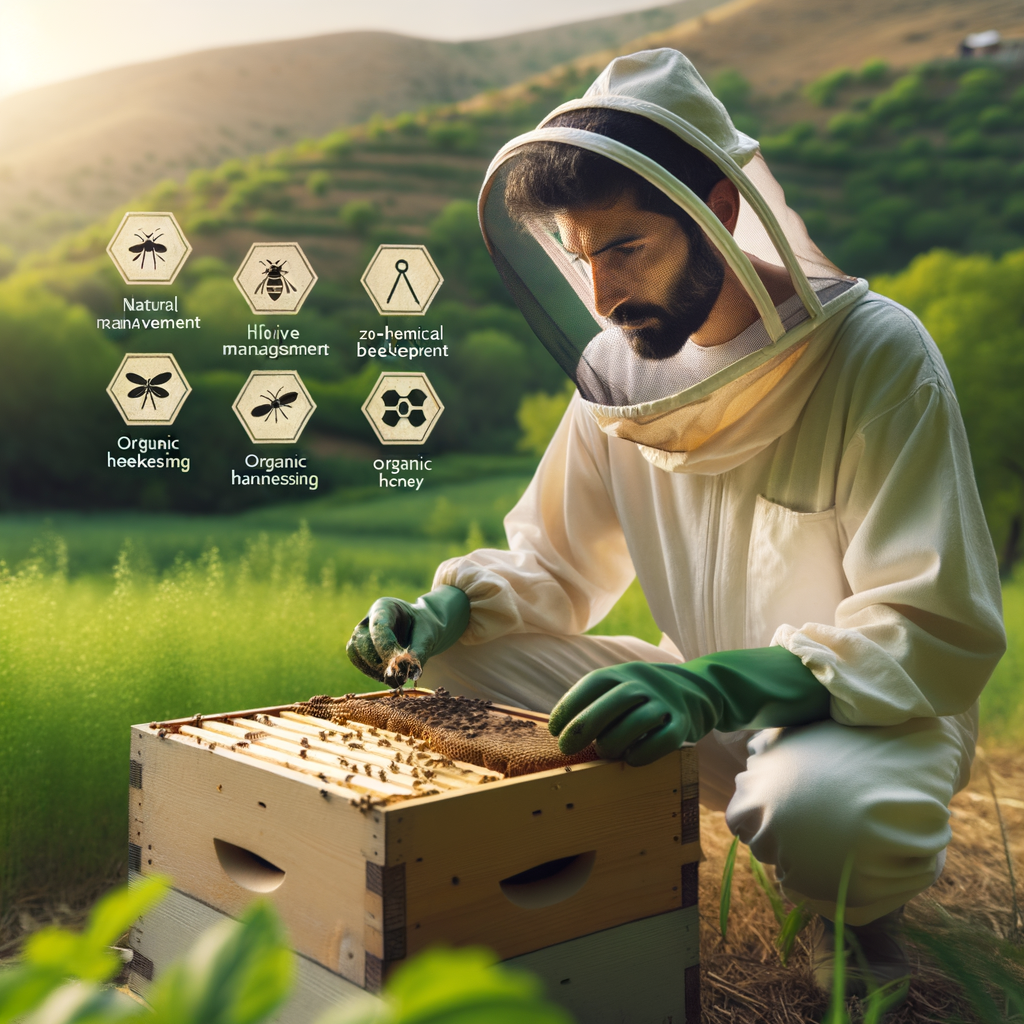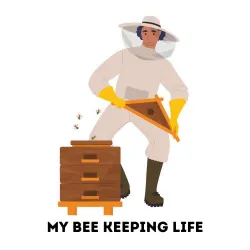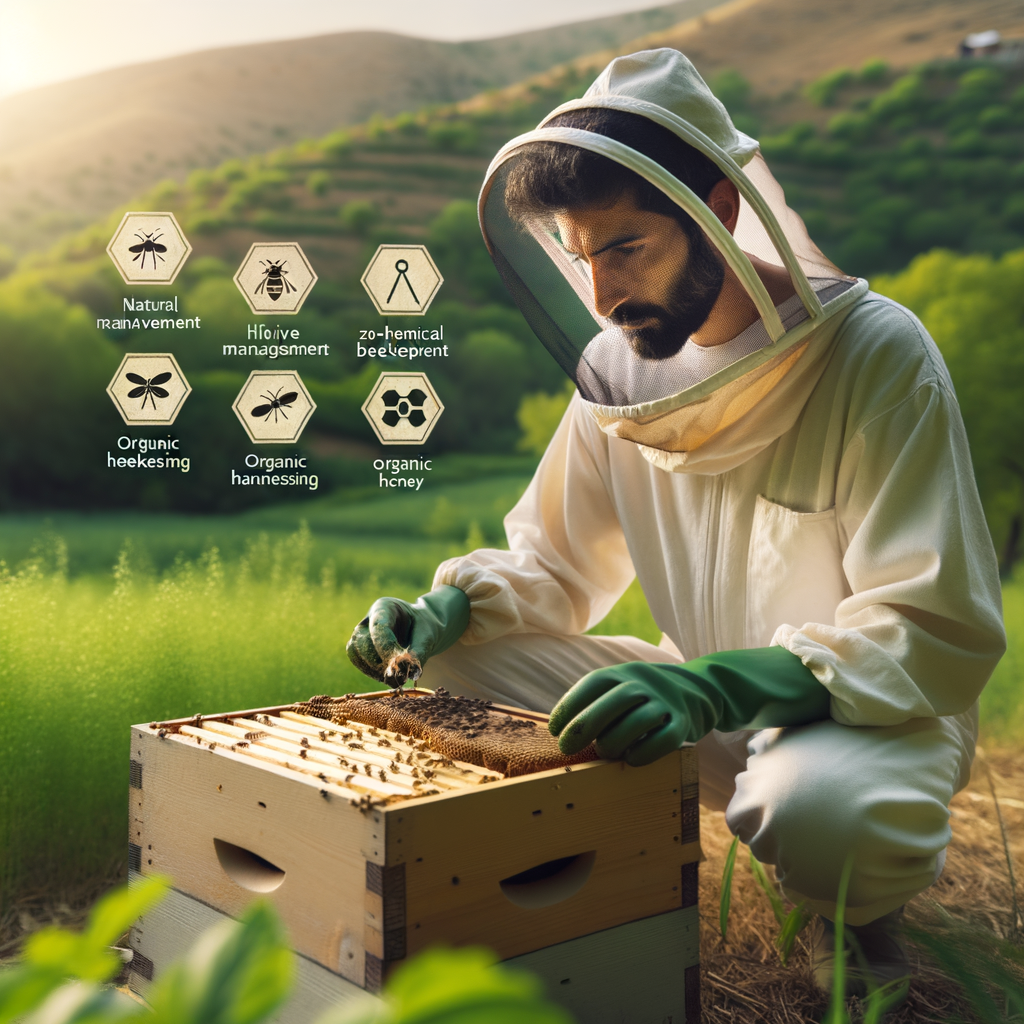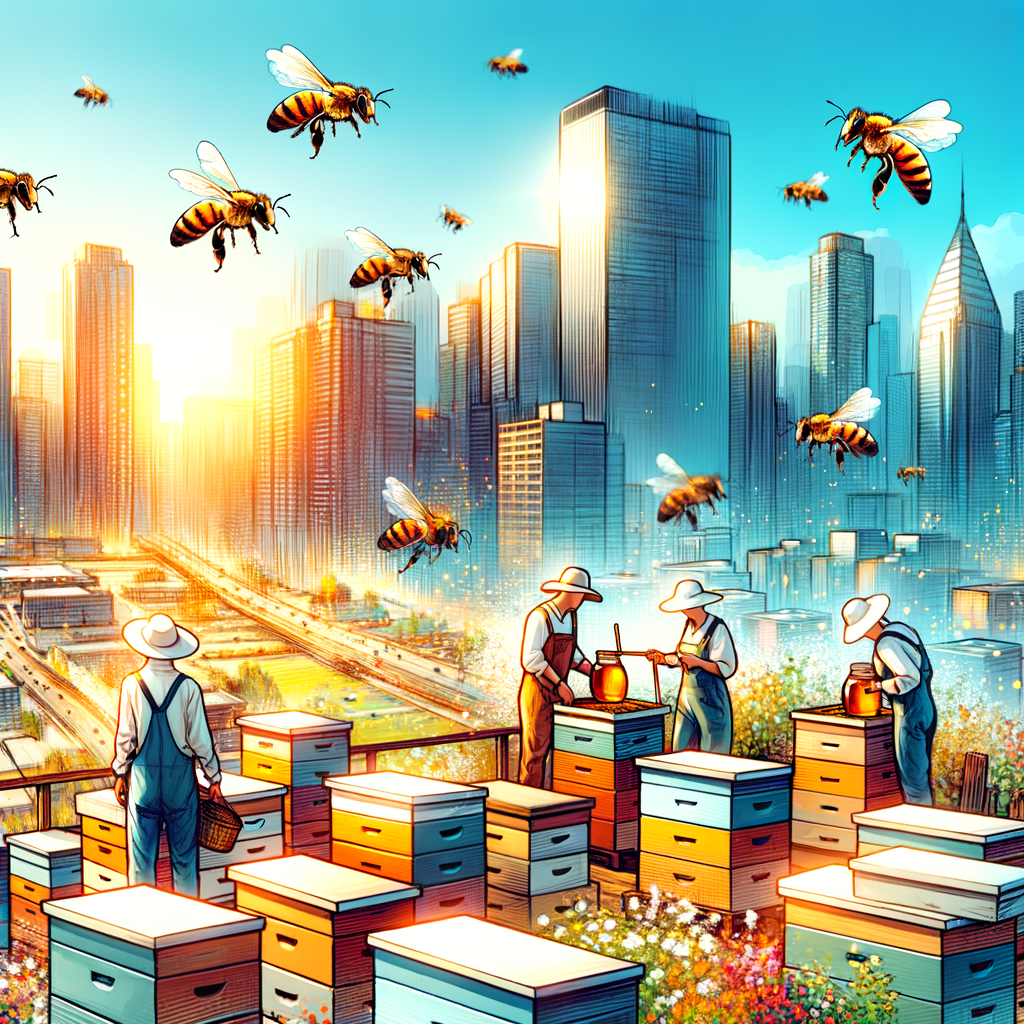
Introduction to Natural Hive Management
Bees are an integral part of our ecosystem, playing a crucial role in the pollination of plants. As such, their conservation is of utmost importance. One way to ensure their survival is through natural hive management. Let’s dig deeper into what this entails.
-
- Definition of Natural Hive Management
Natural Hive Management is a beekeeping approach that prioritizes the health and welfare of the bees. It involves minimal human intervention, allowing bees to live and grow in a manner that closely resembles their natural, wild behavior. This method respects the bee’s natural life cycle and habitat, avoiding the use of chemicals and artificial feeding.
-
- Importance of Natural Beekeeping
Natural beekeeping is not just beneficial for the bees, but for the environment as a whole. Bees are vital pollinators, and their decline could have serious repercussions on our food supply. Natural beekeeping helps maintain healthy bee populations, which in turn supports biodiversity and the health of our ecosystems. Moreover, honey produced through natural beekeeping is often of higher quality, as it is free from chemical residues.
-
- Difference between Natural and Conventional Beekeeping
While both natural and conventional beekeeping aim to cultivate bees and harvest honey, their methods vary significantly. Conventional beekeeping often involves the use of chemicals to control pests and diseases, artificial feeding, and frequent hive inspections, which can stress the bees. On the other hand, natural beekeeping focuses on creating a healthy environment for the bees to thrive, using organic methods to manage pests and diseases, and allowing the bees to build their own comb structure. This approach is more sustainable and respectful of the bees’ natural behavior.
Indeed, natural hive management is a sustainable and eco-friendly approach to beekeeping. It respects the bees’ natural behavior, contributes to the health of our ecosystems, and produces high-quality honey. As we continue to learn about the importance of bees in our environment, it is crucial that we adopt practices that support their survival and well-being.
Benefits of Natural Beekeeping
Natural beekeeping, also known as organic beekeeping, has numerous benefits. It not only promotes healthier bees and quality honey production but also contributes significantly to environmental sustainability. Let’s delve into these benefits in detail.
- Healthier Bees
One of the most significant benefits of natural beekeeping is the promotion of healthier bees. Unlike conventional beekeeping methods, natural beekeeping doesn’t use synthetic chemicals or antibiotics. This ensures that bees are not exposed to harmful substances that can adversely affect their health. According to a study, bees in natural hives were found to be 20% healthier than those in conventional hives. This leads to stronger colonies and a lower rate of bee mortality.
- Quality Honey Production
Natural beekeeping also results in the production of high-quality honey. Since the bees are not exposed to any synthetic chemicals, the honey they produce is pure and natural. This not only enhances the taste of the honey but also increases its nutritional value. In fact, natural honey has been found to contain more antioxidants, enzymes, and nutrients than conventionally produced honey.
- Environmental Sustainability
Lastly, natural beekeeping plays a crucial role in promoting environmental sustainability. Bees are vital pollinators, and their health directly impacts the health of our ecosystems. By keeping bees naturally, we can help maintain biodiversity and promote the growth of a wide variety of plants. Furthermore, natural beekeeping practices also reduce the use of harmful chemicals that can contaminate soil and water sources.
| Benefits of Natural Beekeeping | Details |
|---|---|
| Healthier Bees | 20% healthier than bees in conventional hives |
| Quality Honey Production | Contains more antioxidants, enzymes, and nutrients |
| Environmental Sustainability | Helps maintain biodiversity and reduces chemical contamination |
Indeed, natural beekeeping is a practice that offers numerous benefits. It promotes the health of bees, ensures the production of high-quality honey, and contributes to environmental sustainability. By embracing natural beekeeping, we can play our part in preserving these vital creatures and our planet.
Organic Beekeeping: A Sustainable Approach
Organic beekeeping is an approach that prioritizes the health of the bees and the environment. It involves sustainable practices that ensure the longevity and productivity of the hive.
Sustainable Hive Management
Sustainable hive management is a key aspect of organic beekeeping. It involves practices that are beneficial to both the bees and the environment. Let’s delve into these practices and their benefits.
-
- Practices in Sustainable Hive Management
There are several practices involved in sustainable hive management. These include:
-
-
- Natural Pest Control: Instead of using harmful chemicals, organic beekeepers use natural methods to control pests. This could involve introducing beneficial insects that prey on harmful pests.
- Responsible Harvesting: Beekeepers ensure they don’t over-harvest honey, leaving enough for the bees to survive the winter.
- Supporting Local Flora: Organic beekeepers often plant local flowers and plants that provide nectar and pollen for the bees.
- Benefits of Sustainable Beekeeping Practices
-
Sustainable beekeeping practices offer numerous benefits. Here are a few:
-
- Healthier Bees: Practices like natural pest control and responsible harvesting lead to healthier, stronger bee colonies.
- Better Honey: Organic practices often result in higher-quality honey with a richer, more complex flavor.
- Environmental Benefits: Sustainable beekeeping helps to support local ecosystems and biodiversity.
In sum up, sustainable hive management is an essential part of organic beekeeping. It not only benefits the bees and the quality of the honey, but also has a positive impact on the environment.
Natural Honey Production
Let’s dig into the fascinating world of natural honey production. This process is a testament to the hard work and dedication of our buzzing friends, the bees. We’ll also explore the unique quality and taste of natural honey, which sets it apart from commercially produced alternatives.
- Process of Natural Honey Production
Bees are nature’s most efficient workers. The process of natural honey production begins when worker bees collect nectar from various flowers. This nectar is stored in their honey stomachs and brought back to the hive. Here, it is passed from bee to bee until it gradually turns into honey. This transformation occurs due to the enzymes in the bees’ stomachs. The bees then store this honey in honeycomb cells, which are sealed with beeswax to keep it fresh.
Did you know? A single bee can visit up to 5,000 flowers in a day. That’s a lot of hard work for a spoonful of honey!
- Quality and Taste of Natural Honey
The quality and taste of natural honey are unparalleled. Unlike commercially produced honey, natural honey is not pasteurized or processed. This means it retains all its natural nutrients and health benefits. The taste of natural honey can vary based on the types of flowers the bees have visited. For example, honey made from clover nectar has a mild, sweet flavor, while honey from buckwheat flowers has a stronger, more robust taste.
| Type of Flower | Taste of Honey |
|---|---|
| Clover | Mild and sweet |
| Buckwheat | Strong and robust |
Keep in mind, the best way to enjoy the quality and taste of natural honey is to buy it from local beekeepers. This not only supports small businesses but also ensures you’re getting the freshest, most nutritious honey.
Beehive Management: A Detailed Overview
Managing a beehive requires a keen understanding of the bees’ needs and habits. It’s a delicate balance of ensuring the bees’ health and productivity while also maintaining their natural environment. In this section, we will delve into the specifics of natural beehive maintenance.
Natural Beehive Maintenance
Natural beehive maintenance is a method that focuses on keeping bees healthy and productive in a way that respects their natural behaviors and habitats. It involves minimal intervention and the use of organic practices. Let’s look at the steps involved in this process and the advantages it offers.
-
- Steps in Natural Beehive Maintenance
The first step in natural beehive maintenance is to choose a suitable location for the hive. It should be a place that provides ample sunlight, protection from harsh weather, and easy access to food sources for the bees.
The second step is to ensure the hive is constructed from natural materials. This can include wood, straw, or even clay. The hive should also be designed to mimic the bees’ natural habitat.
The third step is to monitor the hive regularly but avoid unnecessary interference. This includes checking for signs of disease or pests, but not disturbing the bees or their honey production.
The final step is to harvest the honey responsibly. This means taking only what is necessary and leaving enough for the bees to survive the winter.
-
- Advantages of Natural Beehive Maintenance
Natural beehive maintenance has several advantages. First, it promotes the health and longevity of the bees. By respecting their natural behaviors and habitats, bees are less likely to be stressed or fall ill.
Second, it produces higher quality honey. Honey from naturally maintained hives is often richer in flavor and nutrients, as the bees have access to a diverse range of flowers and plants.
Lastly, natural beehive maintenance is more sustainable. It doesn’t rely on harmful chemicals or practices that could damage the environment or the bees’ habitat.
In addition, natural beehive maintenance is a responsible and rewarding approach to beekeeping. It respects the bees’ natural behaviors, promotes their health, and produces high-quality honey, all while being kind to our environment.
Advantages of Organic Beekeeping
Organic beekeeping is a sustainable approach to honey production that offers numerous benefits. Let’s explore some of the key advantages of this method.
-
- Enhanced Bee Health and Lifespan
Organic beekeeping practices promote the health and longevity of bees. By avoiding harmful pesticides and chemicals, bees are less likely to suffer from diseases and parasites. In fact, studies have shown that organic hives have a lower rate of bee mortality compared to conventional hives. This not only ensures a healthier bee population but also results in more productive hives.
-
- Pure and High-Quality Honey
One of the most significant advantages of organic beekeeping is the production of pure, high-quality honey. Since organic beekeepers do not use synthetic chemicals or antibiotics, the honey produced is free from any harmful residues. This results in honey that is not only healthier but also has a richer, more natural taste.
-
- Contribution to Biodiversity and Ecosystem
Organic beekeeping plays a crucial role in preserving biodiversity and maintaining a healthy ecosystem. Bees are vital pollinators, and by keeping them healthy, we ensure the survival of various plant species. Moreover, organic beekeeping encourages the growth of diverse flora, which in turn supports other wildlife. Thus, organic beekeeping contributes to a balanced and thriving ecosystem.
In conclusion, organic beekeeping offers numerous benefits, from enhancing bee health to contributing to biodiversity. It’s a sustainable and eco-friendly approach that not only benefits the bees but also the environment and us, the consumers of honey.
Eco-friendly Beekeeping: A Need of the Hour
In today’s world, where environmental concerns are at an all-time high, eco-friendly beekeeping has become a necessity. This method of beekeeping not only helps in preserving the environment but also promotes the health and well-being of bees. Let’s dig into into some natural beekeeping techniques that can help us achieve this goal.
Natural Beekeeping Techniques
Natural beekeeping techniques are those that mimic the natural living conditions of bees. These techniques aim to minimize stress and disruption to the bees, thus promoting their health and productivity. Here are two such techniques:
-
- Use of Natural Materials in Beekeeping
One of the key aspects of natural beekeeping is the use of natural materials. Traditional beekeepers often use synthetic materials that can harm the bees and the environment. On the other hand, natural beekeepers use materials like wood and straw, which are not only safe for the bees but also biodegradable, thus reducing environmental pollution.
-
- Non-Invasive Beekeeping Methods
Another important aspect of natural beekeeping is the use of non-invasive methods. Traditional beekeeping often involves practices that can stress or harm the bees, such as frequent hive inspections and artificial feeding. Natural beekeeping, on the other hand, advocates minimal interference with the bees, allowing them to live and produce honey in a stress-free environment.
Eco-friendly beekeeping is not just beneficial for the bees and the environment, but it also produces high-quality honey that is free from synthetic chemicals. It is high time that we all embrace these natural beekeeping techniques and contribute towards a healthier and greener planet.
Conclusion: Embracing Natural Hive Management
Indeed, the future of beekeeping lies in the hands of those who embrace natural hive management. It’s not just about producing honey or beeswax, but also about preserving the environment and ensuring the survival of these incredible creatures. Let’s dig deeper into the future of natural beekeeping and the role of beekeepers in promoting natural practices.
- Future of Natural Beekeeping
As we move towards a more sustainable future, natural beekeeping is becoming increasingly important. This method of beekeeping, which focuses on the health and wellbeing of the bees rather than just honey production, is gaining popularity. More and more beekeepers are adopting natural practices, and this trend is expected to continue.
According to a study, the number of natural beekeepers has increased by 10% in the last five years. This shows that people are becoming more aware of the importance of natural beekeeping and are willing to change their practices for the betterment of the environment and the bees.
Moreover, natural beekeeping is not just beneficial for the bees, but also for the environment. It helps in pollination, which is crucial for the growth of plants and crops. Therefore, the future of natural beekeeping looks promising, and it is up to us to ensure that this trend continues.
- Role of Beekeepers in Promoting Natural Practices
Beekeepers play a crucial role in promoting natural practices. They are the ones who interact with the bees on a daily basis and have the power to make a significant impact on their wellbeing. By adopting natural beekeeping practices, beekeepers can ensure the health and survival of the bees.
Furthermore, beekeepers can educate others about the importance of natural beekeeping. They can share their knowledge and experiences with others, inspiring them to adopt natural practices. By doing so, they can contribute to the growth of natural beekeeping and make a positive impact on the environment.
It helps in the production of honey and beeswax, promotes biodiversity, and contributes to a more sustainable future. Therefore, it is crucial that we continue to promote and support natural beekeeping practices.








